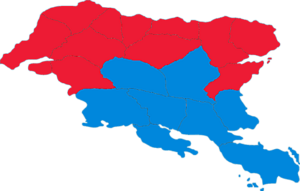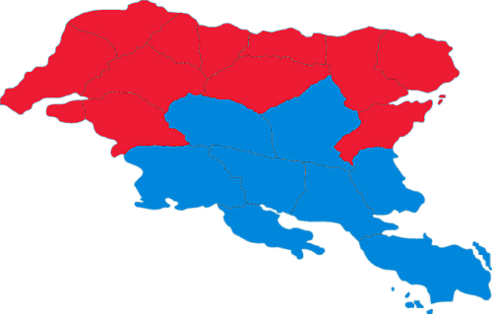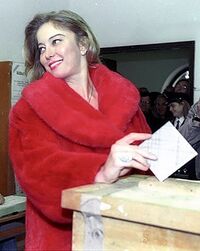Gylian presidential election, 1991: Difference between revisions
mNo edit summary |
mNo edit summary |
||
| Line 201: | Line 201: | ||
[[File:MoanaPozzi4.jpg|thumb|right|200px|Moana casting her vote]] | [[File:MoanaPozzi4.jpg|thumb|right|200px|Moana casting her vote]] | ||
Moana openly admitted she didn't expect to win, but rather she sought to represent | Moana openly admitted she didn't expect to win, but rather she sought to represent {{G-LND}} and promote its message to the best of her ability. As in [[Gylian federal election, 1990|1990]], she was a giddy presence in the campaign, often upstaging the other candidates. Her posters and [[Politics of Gylias#Party political broadcasts|PPB]]s featured her trademark bawdy humour, showing her winking and enticing the viewer, with humorous slogans such as ''Cosa, hai paura?'' ("What, are you afraid?"), ''Non essere timido'' ("Don't be shy"), ''Prima vota Moana! Non farà male'' ("Vote Moana first! It won't hurt"), and ''Rendi il tuo primo voto speciale'' ("Make your first vote special"). | ||
Fellow Italian candidate Carmen adopted a complimentary approach by emphasising her reputation for elegance and {{wpl|polymath}} pursuits, using the slogan "For a more beautiful Gylias". | Fellow Italian candidate Carmen adopted a complimentary approach by emphasising her reputation for elegance and {{wpl|polymath}} pursuits, using the slogan "For a more beautiful Gylias". | ||
Revision as of 09:02, 14 May 2021
| |||||||||||||||||
| Turnout | 94,9% | ||||||||||||||||
|---|---|---|---|---|---|---|---|---|---|---|---|---|---|---|---|---|---|
| |||||||||||||||||
 | |||||||||||||||||
| |||||||||||||||||
Presidential elections were held in Gylias on 22 January 1991.
Progressive Alliance candidate Anina Bergmann defeated Şea Eneþi, who was supported jointly by the National Bloc, Centre Group, Union for a New Republic. The election marked the revival of the buoyant character of presidential elections after the long interruption of the wretched decade, and had a particularly rich crop of candidates.
Procedure
The election was held through instant-runoff voting.
Candidates were registered with Elections Gylias in accordance with normal procedures. They could either be nominated by a political party or electoral bloc, civic organisations, or self-nomination as independents.
Candidates
| Candidate | Nominator | Office(s) held | Details | ||
|---|---|---|---|---|---|
| Anina Bergmann | 
|
Progressive Alliance | None | Campaigned as the main leftist candidate. | |
| Şea Eneþi | 
|
National Bloc–Centre Group–Union for a New Republic | Gylian Council Delegate to the Common Sphere (1986–1989) |
Campaigned on promotion of internationalism and foreign policy. | |
| Moana Pozzi | 
|
Love, Nature, Democracy | Minister without portfolio with responsibility for sexual hygiene (since 1990) |
Campaigned on promotion of free love and sexarchism. | |
| Carmen Dell'Orefice | 
|
Independent | None | Campaigned on promotion of aristerokratia. | |
| Françoise Chatelain | 
|
OMFLG–ACFEN | None | Campaigned on promotion of francité. | |
| Virginia Inman | 
|
Rally for a Free Society–Union of Independents–Free and Voluntaryist Union | None | Campaigned on promotion of market anarchism. | |
| Guiomar Abril | 
|
Union for Freedom and Prosperity | None | Campaigned on promotion of economic liberalism. | |
Results
| Candidate | Nominator | First count | % | Final count | % | |
|---|---|---|---|---|---|---|
| Anina Bergmann | PA | 2.078.438 | 21,1% | 4.363.498 | 50,8% | |
| Şea Eneþi | NB–CG–UNR | 1.970.083 | 20,0% | 4.226.065 | 49,2% | |
| Moana Pozzi | LND | 1.625.319 | 16,5% | |||
| Carmen Dell'Orefice | Independent | 1.477.563 | 15,0% | |||
| Françoise Chatelain | OMFLG–ACFEN | 1.241.153 | 12,6% | |||
| Virginia Inman | RFS–UI–FVU | 1.004.743 | 10,2% | |||
| Guiomar Abril | UFP | 206.859 | 2,1% | |||
| Others/write-ins | 246.260 | 2,5% | ||||
| Total | 9.850.417 | 100% | 8.589.564 | 100% | ||
| Registered voters and turnout | 10.537.854 | 94,9% | ||||
Maps
Analysis
Held after the wretched decade ended, the election was applauded for the return of the customary colourful and lively atmosphere. It boasted a particularly glittering line-up of candidates, notably including Moana Pozzi (the first time an incumbent cabinet minister ran for the presidency), Carmen Dell'Orefice, and Virginia Inman, completed by the venerable perennial candidate Françoise Chatelain. Notably, it was the first presidential election without Luiza Monteira, who had died before. Before the election's first public meeting started, Moana quipped "Lo so, anche a me manca Luiza" ("I know, I miss Luiza too"), drawing cheers from the audience and her fellow candidates.
Incumbent Sáe Nyran declined to run for reelection. Despite the National Bloc's setback in the 1990 federal election, they were confident, and sought a candidate of the same stature. This was Şea Eneþi, a diplomat and former Council Delegate to the Common Sphere, who also received the endorsement of the Centre Group and Union for a New Republic. Şea's campaign was notable for avoiding the expected positioning as the main conservative candidate; instead, she ran on internationalism and diplomacy, a still potent issue as foreign relations recovered from the wretched decade.
Moana openly admitted she didn't expect to win, but rather she sought to represent Love, Nature, Democracy and promote its message to the best of her ability. As in 1990, she was a giddy presence in the campaign, often upstaging the other candidates. Her posters and PPBs featured her trademark bawdy humour, showing her winking and enticing the viewer, with humorous slogans such as Cosa, hai paura? ("What, are you afraid?"), Non essere timido ("Don't be shy"), Prima vota Moana! Non farà male ("Vote Moana first! It won't hurt"), and Rendi il tuo primo voto speciale ("Make your first vote special").
Fellow Italian candidate Carmen adopted a complimentary approach by emphasising her reputation for elegance and polymath pursuits, using the slogan "For a more beautiful Gylias".
The first round saw 6 candidates all winning pluralities in 3–4 regions. The Progressive Alliance candidate, medical doctor Anina Bergmann, won a plurality nationwide, with Şea close behind in second place. Moana finished third, unsurprisingly carrying the non-inscrit-friendly Mişeyáke, Nezyál, and Sváen. Carmen finished fourth overall and unexpectedly benefited from the absence of an official Liberal Union candidate, winning pluralities in Arxaþ, Alţira, Elena, and Tandar.
Françoise won 1% more first preference votes than 1986, and pluralities in three regions: Herlan, Tomes, and Kausania. She carried the first two mainly through strong performances in Narsiad (home to Anca Déuréy University), Maveás, and the "twin cities" Ðoron and Kaşa. Virginia's campaign themes of market anarchism and socialised luxury proved unexpectedly resonant, and she finished 6th, with a respectable 10,2% of first preference votes for a neophyte campaign.
Guiomar Abril had already been the butt of jokes throughout the campaign for his awkward public presence and the severe unpopularity of the Union for Freedom and Prosperity, particularly after the neoliberal conspiracy and dérive au droite. He finished last with 2,1% of the vote, barely bettering the UFP's 1990 result. His humiliation was compounded by the greater mockery he earned for actually winning less votes than the total for other and write-in candidates, an ignominy that had last befallen the Conservative Party and Restoration Party in 1958.
In the final round, Anina largely gained transfers from Moana's voters, while Şea largely gained transfers from Virginia's voters. Carmen and Françoise's voters were more evenly split, contributing to a high percentage of exhausted ballots. Ultimately, Anina won with 50,8% of the vote to Şea's 49,2%.
Anina gained Moana's regions through vote transfers, as well as one of Françoise's — Kausania — and three of Carmen's — Arxaþ, Alţira, and Tandar. Notably, this was the first time a PA candidate managed to win Arxaþ and Alţira, which had eluded the last PA candidate to make it to the final round, Maléna Laryn in 1961. Şea carried most of southern Gylias, narrowly overtaking Anina in Elena. Although she lost, she actually won more votes than the victorious Sáe had done five years before.




